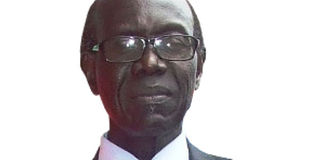Zimbabweans go to the polls to elect president and MPs

The gallant people of Zimbabwe go to the polls tomorrow to elect a president and MPs.
This is the first election since independence in 1980 in which Mr Robert Mugabe will not be the candidate of the ruling party, Zimbabwe African National Union – Patriotic Front (Zanu/PF). If all goes well, this may also be the first free, fair and credible election held in Zimbabwe.
Let me digress a little and recall two events whose anniversary is this month. First, the 39th anniversary of the first time a human being landed and walked on the moon on July 20, 1969. The person who made history on that momentous day was American Astronaut Neil Armstrong whose words still ring loud: “One small step for a man, one giant leap for mankind.”
On July 20, 1969, I was a final year student at the University of East Africa, Makerere and can recall vividly watching a live telecast of that historic event on Uganda Television at Nkrumah Hall. What a day it was.
The second event is personal. Today is the 35th birthday of my eldest son, Mr Christian Acemah. Happy Birthday, Chris. May the Lord bless and be gracious to you.
Can credible elections happen in Zimbabwe?
The frontrunners in Zimbabwe’s presidential elections are current president Emmerson Mnangagwa, flag bearer of Zanu/PF and Mr Nelson Chamisa, flag bearer of the opposition Movement for Democratic Change (MDC). President Mnangagwa, locally known by wananchi as “the crocodile” is a man whose track record as security minister in the 1980s sends a chill down the spine of many Zimbabweans.
I know Chamisa. When I was ambassador of Uganda to Belgium, we attended three sessions of the EU/ACP Joint Parliamentary Assembly in Brussels and Barbados. He struck me as an intelligent, articulate and capable young man.
According to internationally accepted benchmarks, in order to qualify as free, fair and credible, an election must meet certain minimum standards, such as, vote by secret ballot, absence of fear and intimidation, freedom of association and freedom of speech. Above all, a genuinely free, fair and credible election must reflect the will of the people of a country.
The will of the people of a country is the basis of governmental authority and accords legitimacy to governments. Many African governments, including some in our sub-region, are illegitimate precisely because they do not enjoy the will of the people.
Governments imposed on wananchi against the will of the people are sustained by force and they squander vast amounts of public resources to provide security for corrupt and unpopular leaders, MPs and politicians.
Can the Zimbabwe Electoral Commission (ZEC) deliver free, fair and credible elections? The answer is blowing in the wind, as a popular 1960s tune says.
ZEC reminds me of a toothless, spineless and shameless Electoral Commission chaired by Dr Badru Kiggundu, a man who often acted as if the Electoral Commission he headed was not independent, but a department in the secretariat of the ruling party.
While ZEC appears to be biased in favour of the ruling party, ominous warnings from Zanu/PF officials and rumbling noises from officers of the Zimbabwe Defence Forces (ZDF) do not augur well for free and fair polls.
According to reliable sources, a senior Zanu/PF official who is also deputy finance minister allegedly warned that ZDF would not allow MDC’s Chamisa to lead Zimbabwe if he is declared winner. The Zanu/PF official said that soldiers and veterans of ZDF who “took over the country and practically snatched power from Mugabe last year, would not hand over to Chamisa”.
ZDF is neither neutral, nor a passive onlooker. It has openly expressed support and preference for president Mnangagwa and his vice president, Gen Constantino Chiwenga, a former commander of ZDF.
As one looks forward to the verdict of the AU, SADC, EU and Commonwealth Observer groups, early warning signs indicate that Zimbabwe’s elections may once again not qualify to be free, fair and credible.
Mr Acemah is a political scientist and retired career diplomat.




